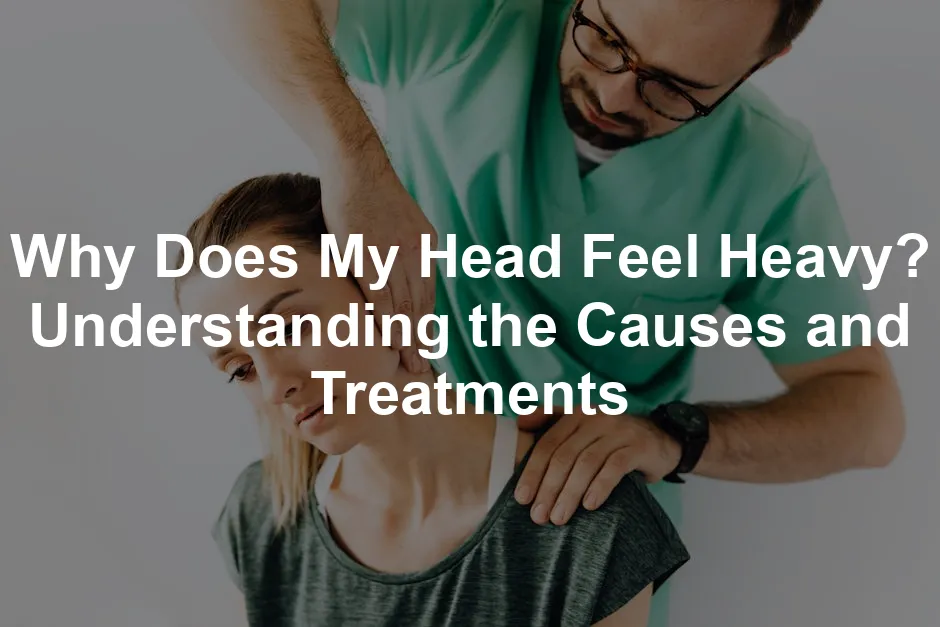
Why Does My Head Feel Heavy? Understanding the Causes and Treatments
Introduction
Have you ever felt like your head weighs a ton? This sensation is quite common and can stem from various factors. Identifying the underlying causes is crucial for effective treatment. In this article, we will look at the causes, symptoms, and remedies for that heavy head feeling.
Summary and Overview
A “heavy head” typically refers to a sensation that can feel like pressure or weight on the skull. It may also include accompanying symptoms like dizziness or tension. Many people experience this feeling, and certain groups, such as those with stress or migraines, are more prone to it. Understanding the symptoms associated with a heavy head is essential. Treatment options vary but can include lifestyle changes, home remedies, and medical interventions. If the sensation persists, consulting a healthcare professional is vital for further evaluation.

Causes of a Heavy Head
1. Balance Disorders
Balance disorders can cause sensations of heaviness. Conditions like Meniere’s disease and vestibular neuritis often lead to dizziness and loss of balance. Statistics suggest that around 35% of adults aged 40 and older report some form of balance disorder in their lifetime. Recognizing these symptoms can help guide appropriate treatment.
2. Muscle Strain
Muscle strain is a common cause of a heavy head. Poor posture or prolonged screen time can strain neck muscles. This tension can extend to the shoulders, leading to a sensation of heaviness in the head. Simple adjustments, like taking breaks and improving posture, can help alleviate this discomfort.
3. Sinus Issues
Sinus issues, such as sinusitis or allergic reactions, can contribute to a heavy feeling in the head. When the sinuses become inflamed, they can cause facial pressure and nasal congestion. These symptoms can make the head feel heavier than usual. Treatment often involves decongestants or nasal sprays to reduce inflammation and relieve pressure. Try a Nasal Spray Decongestant to help clear those sinuses and lighten that heavy feeling!
By understanding these causes, you can take proactive steps to address the feeling of heaviness in your head. Whether it’s through lifestyle changes, home remedies, or seeking medical help, there are ways to find relief. Don’t hesitate to consult a healthcare professional if symptoms persist or worsen.

4. Tension Headaches
Tension headaches are the most common type of headache. They often feel like a tight band around your head. You might experience mild to moderate pain, usually on both sides. Stress, anxiety, and poor posture can trigger these headaches. These headaches can last from 30 minutes to several days, affecting daily life.
Statistics show that over 70% of people experience tension headaches at some point. They are more frequent in women than in men. Understanding the symptoms and triggers can help manage this discomfort effectively. Consider keeping some Acetaminophen Extra Strength Tablets handy for those pesky tension headaches!
5. Stress and Anxiety
Stress and anxiety can physically manifest in various ways, including a heavy head. When you feel anxious, your body reacts with tension. This tension can lead to headaches and a feeling of pressure. You might find it difficult to concentrate, and your mood may fluctuate.
This mind-body connection is crucial. Mental health affects physical health, and vice versa. Techniques like mindfulness and relaxation exercises can help reduce stress levels. Addressing anxiety can alleviate the physical symptoms linked to it. Consider using a Mindfulness Journal to jot down your thoughts and reduce that anxiety!

6. Fatigue and Sleep Disorders
Fatigue and sleep disorders, such as sleep apnea, can contribute to that heavy sensation in your head. Poor sleep quality leaves you feeling drained. This fatigue can lead to headaches and difficulty concentrating.
Prioritizing sleep hygiene is essential for overall health. Aim for a consistent sleep schedule, create a restful environment, and limit screen time before bed. Restorative sleep is vital for maintaining a healthy mind and body. A Sleep Mask for Better Sleep can help block out distractions and improve your sleep quality!

7. Dehydration and Nutrition
Dehydration can lead to a heavy feeling in your head. Insufficient fluid intake affects cognitive function and may cause headaches. Poor nutrition is another factor; a balanced diet supports brain health.
According to studies, around 75% of Americans are chronically dehydrated. Staying hydrated is crucial for optimal brain performance. Keep water handy throughout the day to maintain proper hydration levels. A Water Bottle with Time Marker can be a fun way to track your water intake!

8. Medication Side Effects
Certain medications can cause a heavy head feeling. Common culprits include antihistamines, muscle relaxants, and some antidepressants. If you notice this sensation after starting a new medication, it’s important to consult your healthcare provider.
They can help determine if your medication is the cause and discuss alternatives or adjustments. Don’t hesitate to reach out about any side effects you experience. If you find yourself dealing with headaches, consider keeping a Tension Headache Relief Gel on hand for quick relief!

9. Rare Causes
While most causes of a heavy head are common, some rare conditions may contribute. These include myasthenia gravis and brain tumors. If you experience additional symptoms, like dizziness or blurred vision, it’s crucial to seek medical evaluation.
These rarer conditions require proper diagnosis and treatment. Timely intervention can significantly impact outcomes, so don’t ignore concerning symptoms. Always prioritize your health and consult a professional when needed.

Associated Symptoms
A heavy head often comes with other symptoms. You might feel dizziness, neck pain, or a sense of brain fog. These sensations can vary based on the underlying cause. For instance, if your head feels heavy due to sinus issues, you may also experience facial pressure or nasal congestion. Muscle strain might lead to stiffness in your neck and shoulders. Stress and anxiety can manifest as a tight feeling around your head. Each symptom helps pinpoint what’s going on. Recognizing these accompanying signs can guide you toward appropriate treatment.

Treatment Options
1. Home Remedies
There are several home remedies to alleviate a heavy head. First, staying hydrated is crucial. Water helps maintain cognitive function and reduces headaches. Rest is also essential. Giving your body time to recharge can work wonders. Gentle neck exercises can ease tension too. Try rolling your shoulders or tilting your head side to side. Heat therapy, such as a warm compress, can relieve muscle tightness. Alternatively, cold packs can help numb pain. These remedies are simple yet effective. A Warm Compress Heating Pad can be a delightful addition to your relaxation routine!

2. Over-the-Counter Medications
Over-the-counter (OTC) medications can offer relief for discomfort. Common options include acetaminophen, ibuprofen, and naproxen. These medications can help reduce headache pain and inflammation. Always follow the recommended dosage on the packaging. It’s wise to avoid using pain relievers more than twice a week to prevent rebound headaches. If you’re unsure which medication is right for you, consult a healthcare professional for guidance. If you prefer ibuprofen, check out these Ibuprofen Tablets for quick relief!

3. Lifestyle Changes
Making lifestyle changes can significantly improve your symptoms. Start by focusing on your posture. Ergonomic adjustments at your workspace can help reduce neck strain. Incorporate regular physical activity into your routine. Exercise not only boosts mood but also helps alleviate tension. Stress management techniques, such as deep breathing or yoga, are beneficial too. Prioritizing relaxation can reduce the heaviness in your head. A balanced diet and adequate sleep are essential for overall wellness. Small adjustments can lead to significant improvements. If you’re into yoga, a Yoga Mat for Stress Relief might be just what you need!

4. Professional Treatment
If your heavy head sensation persists, it may be time to seek medical help. Persistent symptoms can indicate an underlying health issue that requires attention. When should you consider a doctor’s visit? If the heaviness is accompanied by severe headaches, confusion, or vision changes, these could be warning signs.
Your healthcare provider may suggest diagnostic tests to pinpoint the issue. Common tests include MRI and CT scans. These imaging techniques help visualize the brain and neck, revealing potential problems. Based on the findings, referrals to specialists may be necessary. For example, a neurologist can assess your symptoms further.
Getting to the root cause of your discomfort is essential for effective treatment. Don’t hesitate to reach out for professional support if you experience ongoing heaviness in your head. Your health is worth prioritizing. If you want to keep track of your health, a Fitness Tracker can be a helpful tool!

When to See a Doctor
Recognizing when to seek medical attention is crucial. Watch for warning signs that require immediate help. Severe headaches that feel different from your usual pain can be alarming. Neurological symptoms, such as difficulty speaking, sudden weakness, or loss of coordination, also warrant urgent care.
If you experience persistent nausea, vomiting, or fever along with heaviness, don’t ignore these signs. These could signal a more serious condition. Ignoring worsening symptoms can lead to complications. Always err on the side of caution when it comes to your health.

Conclusion
In summary, a heavy head can stem from various causes, ranging from tension headaches to stress. Identifying these causes is vital for finding the right treatment. If symptoms persist or worsen, seeking professional help is essential. Prioritize your well-being by consulting healthcare professionals when needed. Your health deserves attention, so don’t hesitate to take that crucial step towards feeling better. And while you’re at it, consider unwinding with a Weighted Blanket for Stress Relief to help ease your mind!

FAQs
What causes a heavy feeling in the head?
A heavy feeling in the head can arise from several common issues. Tension headaches are a major culprit. These headaches often feel like a tight band around your head. They can be triggered by stress, poor posture, or fatigue. Sinus problems also play a role. Sinusitis can lead to inflammation and pressure, causing that heavy sensation.
How can I relieve the pressure in my head?
To relieve pressure in your head, start by staying hydrated. Drinking enough water can make a big difference. Relaxation techniques are also helpful. Consider deep breathing exercises or gentle yoga. Over-the-counter medications like ibuprofen or acetaminophen can provide relief as well. Always follow the recommended dosages for safety.
Is a heavy head a sign of something serious?
While a heavy head can signal serious conditions, most cases are benign. Common causes like tension headaches or sinus issues are usually not dangerous. However, if accompanied by other concerning symptoms, it’s wise to seek medical advice. Your healthcare provider can help determine the cause and recommend appropriate treatment.
When should I see a doctor for heavy head symptoms?
You should see a doctor if your heavy head feeling persists or worsens. Pay attention to additional symptoms. Severe headaches, confusion, or vision changes are red flags. Other concerning signs include sudden weakness or difficulty speaking. If you experience any of these symptoms, don’t hesitate to consult a healthcare professional.
Can anxiety cause a heavy feeling in the head?
Yes, anxiety can certainly contribute to a heavy feeling in your head. When you’re anxious, your body reacts with tension. This tension can lead to headaches and a sensation of heaviness. It’s essential to manage anxiety through relaxation techniques and, if necessary, professional help.
How does posture affect the heaviness in my head?
Posture plays a significant role in how heavy your head feels. Poor posture, especially when sitting or using screens, can strain neck muscles. This strain may lead to tension headaches and a sensation of heaviness. Maintaining good posture can alleviate discomfort and improve overall well-being.
Are there specific exercises to relieve a heavy head feeling?
Yes, specific neck and shoulder exercises can help relieve that heavy feeling. Try simple stretches like neck tilts or shoulder rolls. You can also perform the chin tuck. Stand against a wall, pull your shoulders back, and tuck your chin down gently. These exercises can ease muscle tension and provide relief.
Please let us know what you think about our content by leaving a comment down below!
Thank you for reading till here 🙂
All images from Pexels




